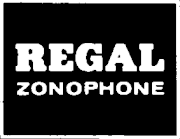This article needs additional citations for verification. (February 2013) |
| Regal Zonophone | |
|---|---|
 The 1967–75 logo | |
| Parent company | Universal Music Group (Australia & New Zealand) Warner Music Group (rest of the world) |
| Founded | 1932 |
| Status | Defunct |
| Distributor(s) | EMI Recorded Music Australia, Universal Music New Zealand; Parlophone Records (rest of the world) |
| Country of origin | United Kingdom |
Regal Zonophone Records was a British record label formed in 1932, through a merger of the Regal and Zonophone labels. This followed the merger of those labels' respective parent companies – the Columbia Graphophone Company and the Gramophone Company – to form EMI. At the merger, those records from the Regal Records catalogue were prefixed 'MR' and those from the Zonophone Records catalogue were prefixed 'T'.[1] Record releases after the merger continued using only the 'MR' prefix.[2]
Originally Regal Zonophone handled American releases from Okeh Records, Victor Records and Columbia Records, as well as offering home-grown recordings by artists such as Gracie Fields[3] and George Formby.[4] The label is also known for its releases of Salvation Army (particularly brass band) music.[5][6][7]
In the 1950s the Australian division of Regal Zonophone played an important role in the emerging Australian country music genre, signing several emerging country stars including Slim Dusty, Smoky Dawson, Reg Lindsay and Chad Morgan. Slim Dusty's 1957 Regal Zonophone hit "A Pub with No Beer"[8][9] became the biggest-selling Australian recording ever released up to that time.
EMI revived the Regal Zonophone imprint in 1967 to handle the Essex Music/Straight Ahead producing account that had moved from Deram (after one Procol Harum single and two singles by The Move) and continued well into the early 1970s, with successful producers Denny Cordell and Tony Visconti both having production companies releasing records through the label. During this period the label had both album and single success with artists such as The Move,[10] Procol Harum,[11] Joe Cocker,[12] and Tyrannosaurus Rex.[13] During the mid-1970s, many of these production deals ended and, despite a few sporadic releases by Blue Mink,[14] Geordie,[15] Dave Edmunds,[16] and Grunt Futtock[17] (a one-off project featuring Roy Wood, Steve Marriott, Peter Frampton and Andy Bown), EMI stopped using the imprint as a major pop label. Many of the label's artists moved to Fly Records or to the EMI imprint.
Regal Zonophone was revived by EMI in 1985-86 for Frank Sidebottom, and again at the end of the 1990s as a reissue label curated by the UK band Saint Etienne. This incarnation of the label is no longer active, as EMI relaunched Regal and Zonophone as separate imprints of Parlophone. In 2013, both Regal and Zonophone were taken over by Warner Music Group after Universal Music Group spun off Parlophone from EMI, at the request of international regulators.
However, the Australian and New Zealand Regal Zonophone catalogues, including recordings by Slim Dusty, were ceded to Universal Music Australia's imprint EMI Recorded Music and Universal Music New Zealand respectively.[18][19]
- ^ [1] Archived 19 June 2014 at the Wayback Machine
- ^ Arthur Badrock and Frank Andrews: Regal Records 1914 to 1932 2nd Edition published June 2009 by The City of London Phonographic and Gramophone Society.
- ^ "Gracie Fields 78 RPM - Discography - UK - 78 RPM World". 45worlds.com. Retrieved 23 August 2014.
- ^ "The George Formby Discography". Georgeformby.co.uk. Retrieved 23 August 2014.
- ^ "Regal-Zonophone Records UK". 45-sleeves.com. Retrieved 23 August 2014.
- ^ "Music in The Salvation Army". Salvationarmy.org.au. Retrieved 23 August 2014.
- ^ "Salvation Army Recordings Regal 32-57 volume 1". Salvo Audio. Retrieved 23 August 2014.
- ^ Greg Adams. "Regal Zonophone Collection - Slim Dusty | Songs, Reviews, Credits, Awards". AllMusic. Retrieved 23 August 2014.
- ^ "Slim Dusty With Dick Carr And His Bushlanders - A Pub With No Beer (Vinyl) at Discogs". Discogs.com. Retrieved 23 August 2014.
- ^ "Move, The Discography at Discogs". Discogs.com. Retrieved 23 August 2014.
- ^ "The Regal Zonophone albums reviewed by John Alroy, online". Procolharum.com. Retrieved 23 August 2014.
- ^ "Joe Cocker - Joe Cocker! (Vinyl, LP, Album) at Discogs". Discogs.com. Retrieved 23 August 2014.
- ^ "Tyrannosaurus Rex Discography at Discogs". Discogs.com. Retrieved 23 August 2014.
- ^ "Blue Mink - The Banner Man / Mind Your Business - Regal Zonophone - UK - RZ 3034". 45cat. Retrieved 23 August 2014.
- ^ "GEORDIE | Artist". Official Charts. Retrieved 23 August 2014.
- ^ "Dave Edmunds Rockpile - I'm Comin' Home / Country Roll - Regal Zonophone - UK - RZ 3032". 45cat. 2 April 2012. Retrieved 23 August 2014.
- ^ "Grunt Futtock - Rock 'N' Roll Christian (Vinyl) at Discogs". Discogs.com. Retrieved 23 August 2014.
- ^ "Universal Absorbs EMI And Then There Were Three". 31 January 2013.
- ^ "Universal's EMI Deal Approved By New Zealand Regulators". Billboard. 21 June 2012.